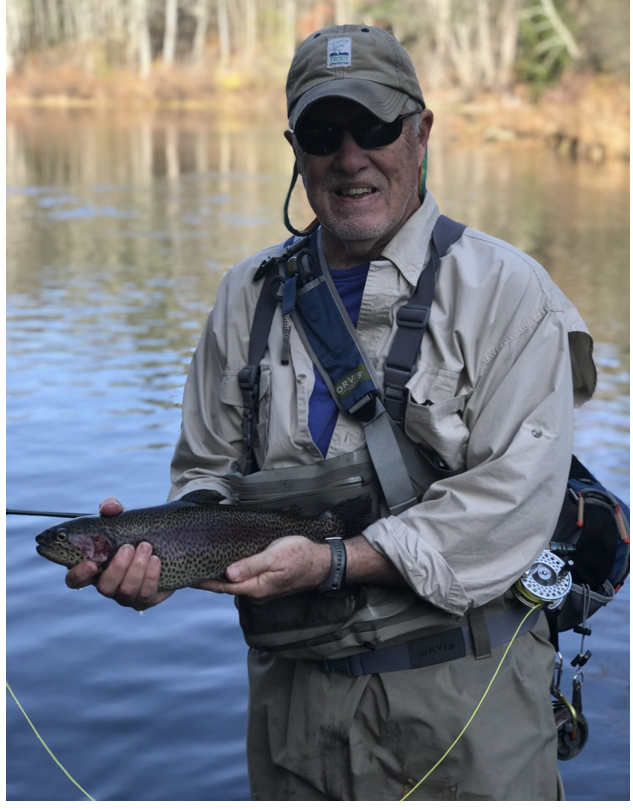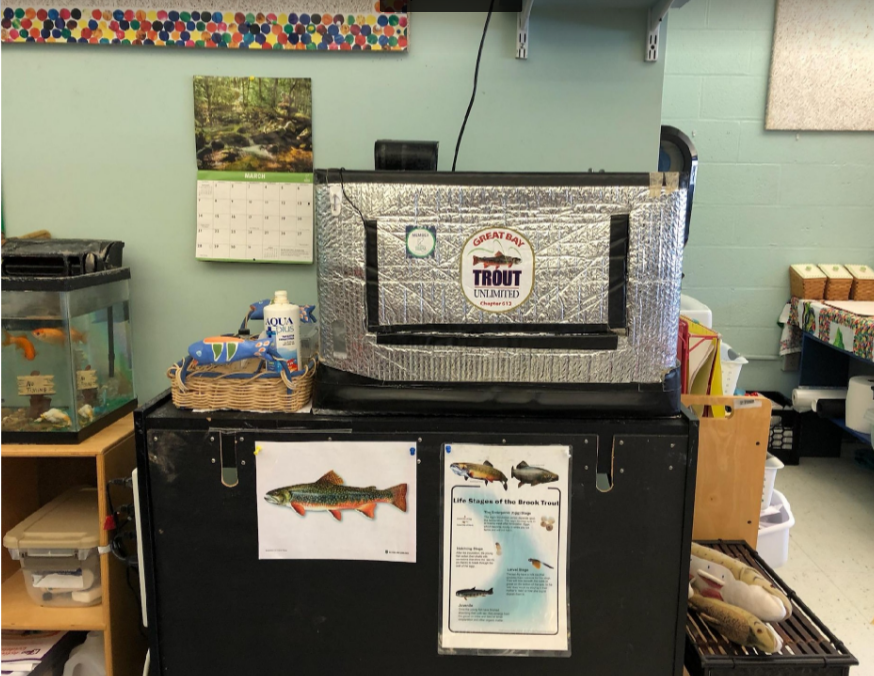WRITING ON THE FLY
By GEORGE LISET, InDepthNH.org
There are not many things more enjoyable to a fly fisher than hiking into a river or stream and catching a beautiful brook trout. Sometimes when that happens we take it for “Granite.” Just a little New Hampshire humor.
Seriously though, there is a lot that goes on behind the scenes to make that happen. The Trout in the Classroom program, a Trout Unlimited initiative, is one of them.
Mark Seymour, Great Bay Trout Unlimited Chapter 613 member, helps to coordinate the program on the Seacoast of New Hampshire. GBTU started the classroom program in 2006 with a classroom at Woodman Park Elementary School in Dover.
Carol Finn, current STEM Coordinator at the school, has been involved since the inception, and has been the model by which other schools have followed.
Finn uses the Next Gen Science standards to help design a curriculum for her students, developed around Trout in the Classroom, which is designed to maximize the hands-on learning experience. Topics such as the trout life cycle, the environment, habitat diversity, water quality and insects are discussed in the classroom.

The Trout in the Classroom program culminates in a field trip experience to the Cocheco River to release the trout. Trout Unlimited volunteers set up stations along the river to enhance the students’ experience. Stations include casting a fly rod, tying a fly, setting up a shelter, taking water samples, studying the anatomy of fish and insects to name a few.
According to Finn, the field experience is a lasting experience whose lessons are remembered for life. This experience could not be as successful without the support of Great Bay Trout Unlimited.
GBTU currently sponsors 20 Seacoast classrooms from Farmington to Hampton Falls to Kingston. The cost of providing a Chiller for a classroom is $800. GBTU provides this at no cost to the classroom or school district. This is a real grassroots program, fully funded by the GBTU membership through donations and fundraising.
A Chiller is a specially designed cold-water fish tank. The tank is designed to help assimilate the trout fry to be ready to return to their natural habitat after the trout are raised by the classroom. Each classroom has to have a permit from Fish and Game. This is to ensure that the programs are coordinated and that when the trout are released, they are not released into a wild trout population.
Fish and Game also provides the trout eggs for the Chillers to ensure a quality of breeding.
Trout like cold oxygenated water so the Chillers usually start out with a temperature of 35-37 degrees. This is the temperature at the hatchery where the fish come from. The temperature then goes up 1 degree a week until the temperature reaches 45 degrees, which is about what the water temperature is at the river at the time of release.
The educational opportunities for the students in the classroom are invaluable.
The Trout in the Classroom Program is coordinated through Fish and Game. Judy Tumosa, Watershed Educational Specialist for Fish and Game, helps to oversee the program. According to Judy, there are currently 85 to 95 schools and classrooms in New Hampshire that have a Chiller, sponsored by their local Trout Unlimited Chapter.
Tumosa mentioned that the program has taken a hit this past year because of COVID. Some classrooms were not able to run their Chillers because teachers and students were not allowed into classrooms. This was a lost hands-on opportunity for the students and also affected the number of trout being released into New Hampshire rivers and streams.
Great Bay Trout Unlimited Chapter 613 and other Trout Unlimited chapters throughout the state have been affected by COVID as well. Many of the fundraisers that help fund the Trout in the Classroom programs were cancelled, as were other community outreach programs. If you would be interested in helping to support the Trout in the Classroom Program, or interested in finding out more information about the program, you can access the following links:
If you would like more information about the Watershed Educational Program, you can contact Judy Tumosa at the following link: https://wildlife.state.nh.us/fishing/trout-streams.html
George Liset of Dover is an outdoor writer and avid fly fisherman who shares insights of his time on the water exploring New Hampshire streams and rivers as well of those around New England. George is a graduate of Wheaton College, Illinois, and the University of New Hampshire.





